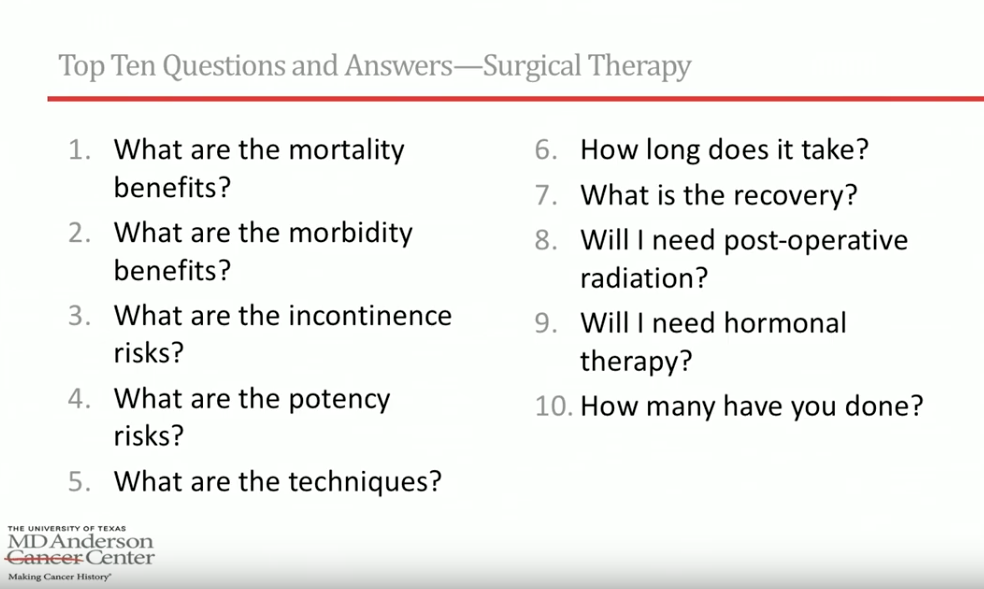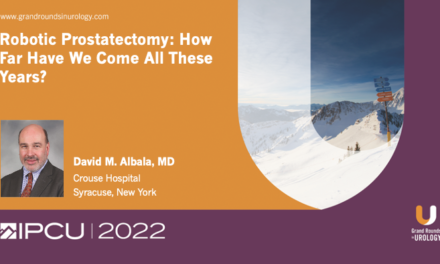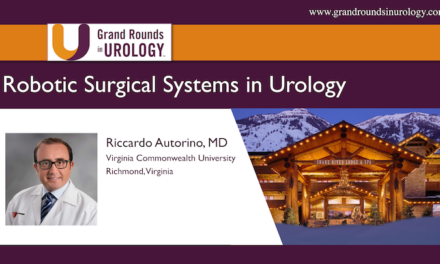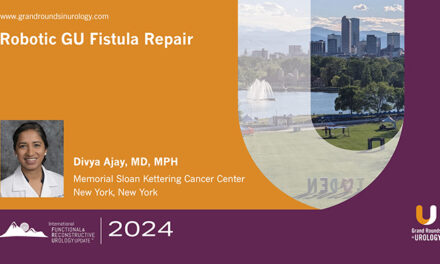John W. Davis, MD, FACS, presented “Robot Assisted Radical Prostatectomy in 2018: My Best Answers to the Most Common Patient Questions” during the 23rd Annual Innovations in Urologic Practice on September 14, 2018 in Santa Fe, New Mexico.
How to cite: Davis, John W. “Robot Assisted Radical Prostatectomy in 2018: My Best Answers to the Most Common Patient Questions” September 14, 2018. Accessed Nov 2025. https://grandroundsinurology.com/robot-assisted-radical-prostatectomy-in-2018/
Robot Assisted Radical Prostatectomy in 2018: My Best Answers to the Most Common Patient Questions – Summary:
John W. Davis, MD, provides instructions regarding how to build an effective handout for patients prior to robot assisted radical prostatectomy. Specifically, he describes commonly asked patient questions and how to answer in an evidence-based and trustworthy manner.
Abstract:
Building a successful robotic prostatectomy practice requires several elements beyond surgical skill. One important point often overlooked is the ability to communicate effectively with patients. However, with increased patient volume, there is increased demand for physician time in the clinic. Electronic medical record (EMR) issues further exacerbate this problem.
Therefore a well-constructed patient handout is an important adjunct. This presentation details key elements of an effective handout. First, it is important to provide patients with neutral, non-market oriented weblinks. For example, the Urology Care Foundation website utilizes layman’s terms and patient-oriented writing. Though directed toward professionals, the American Urological Association (AUA) Guidelines can be a meaningful resource for patients.
A communicative handout should also include specifics on your program and experience, answer perioperative questions in detail, incorporate guidelines statements and structure, refresh yearly, include personal details and humor, and be aware of your patient population needs.
For further reference, see Dr. Davis’s textbook chapter, Personalized Versus Generic Patient Handouts: Tools to Improve Patient Knowledge on Treatment Options and Perioperative Care, with Springer publishing.
About Innovations in Urologic Practice
Innovations in Urologic Practice (IUP) is an annual CME-accredited conference devoted to updating urologists on the rapidly changing healthcare environment. Topics focus on innovative diagnostic and treatment strategies, controversies, new and currently developing technologies, and challenges in today’s urologic practice. Dr. Davis presented this lecture during the 23rd IUP in 2018. Please visit this page in order to learn more about future IUP meetings.
ABOUT THE AUTHOR
John W. Davis, MD, is a Professor of Urology and Director of the Urosurgical Prostate Program at the University of Texas MD Anderson Cancer Center in Houston. He received his BS in Biology at Davidson College in North Carolina in 1990. He then went on to earn his medical degree at the University of Virginia in 1994 and completed his residency training at Eastern Virginia Graduate School of Medicine in Norfolk. Dr. Davis had fellowship training in prostate cancer research in the Department of Microbiology and Molecular Cell Biology at Eastern Virginia Medical School, and received an American Foundation of Urologic Disease Scholar award for proteomic applications in prostate cancer biomarkers. He completed a Clinical Fellowship in Urologic Oncology at the MD Anderson Cancer Center, and a Fellowship in Laparoscopic Urology at Charité Hospital in Berlin, Germany, under the mentorship of Ingolf Tuerk.
Dr. Davis’ clinical interests include patients with urologic cancers, laparoscopic/robotic surgery, and general urology. His academic interests include quality of life after prostate cancer treatment, outcomes for robotic radical prostatectomy, high-risk prostate cancer trials, active surveillance for prostate cancer, and development of robotic surgical techniques for invasive bladder cancer. He has participated as an investigator in several Southwest Oncology Group and industry-sponsored clinical trials.






